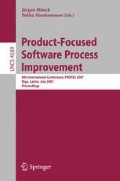Abstract
The Capability Maturity Model Integration (CMMI) is a structured representation of software development processes that can support an organi-sation’s software process improvement (SPI) strategies. However, CMMI and SPI initiatives generally exhibit low levels of adoption and limited success. One of the major reasons for these shortcomings is that many organisations undertake SPI initiatives without knowing whether or not they are ready to undertake them. Our previous research has enabled us to develop a software process improvement readiness model/framework to address this problem.
This paper reports on the implementation of the SPI readiness model in three large-scale case studies. We have found that organisations with higher CMMI levels are more ready for SPI initiatives than organisations with low CMMI levels. We suggest that organisations at higher CMMI levels have developed capabilities that enable them to further leverage SPI than organisations at lower CMMI levels.
Access this chapter
Tax calculation will be finalised at checkout
Purchases are for personal use only
Preview
Unable to display preview. Download preview PDF.
References
SEI: Capability Maturity Model® Integration (CMMISM), Version 1.1. SEI, CMU/SEI-2002-TR-029, Software Engineering Institute, USA (2002)
Leung, H.: Slow change of information system development practice. Software quality journal 8(3), 197–210 (1999)
SEI: Process Maturity Profile. Software Engineering Institute Carnegie Mellon University (2004)
SEI: Process maturity profile of the software community. Software Engineering Institute (2002)
Ngwenyama, O., Nielsen, P.: A Competing values in software process improvement: An assumption analysis of CMM from an organizational culture perspective. IEEE Transactions on Software Engineering 50, 100–112 (2003)
Niazi, M., Wilson, D., Zowghi, D.: A Maturity Model for the Implementation of Software Process Improvement: An empirical study. Journal of Systems and Software 74(2), 155–172 (2005)
Goldenson, D.R., Herbsleb, J.D.: After the appraisal: A systematic survey of Process Improvement, Its benefits, And Factors That Influence Success. SEI, CMU/SEI-95-TR-009, Software Engineering Institute, USA (1995)
Zahran, S.: Software process improvement - practical guidelines for business success. Addison-Wesley, London (1998)
Niazi, M., Wilson, D., Zowghi, D.: Critical success factors and critical barriers for software process improvement: An analysis of literature. In: the proceedings of. Australasian Conference on Information Systems (ACIS 2003), Perth, Australia (2003)
Niazi, M., Wilson, D., Zowghi, D.: Critical Barriers for SPI Implementation: An empirical study. In: IASTED International Conference on Software Engineering (SE 2004) Austria, pp. 389–395 (2004)
Niazi, M., Wilson, D., Zowghi, D.: Critical Success Factors for Software Process Improvement: An Empirical Study. Software Process Improvement and Practice Journal 11(2), 193–211 (2006)
Yin, R.K.: Applications of Case Study Research. Sage Publications, Thousand Oaks (1993)
Cooper, D., Schindler, P.: Business research methods, 7th edn. McGraw-Hill, New York (2001)
Baddoo, N., Hall, T.: De-Motivators of software process improvement: An analysis of practitioner’s views. Journal of Systems and Software 66(1), 23–33 (2003)
Paulish, D., Carleton, A.: Case studies of software process improvement measurement. IEEE Computer 27(9), 50–59 (1994)
Briand, L., Wust, J., Lounis, H.: Replicated Case Studies for Investigating Quality Factors in Object Oriented Designs. Empirical Software Engineering 6(1), 11–58 (2001)
Daskalantonakis, M.K.: Achieving higher SEI levels. IEEE Software 11(4), 17–24 (1994)
Beecham, S., Hall, T., Rainer, A.: Building a requirements process improvement model. Department of Computer Science, University of Hertfordshire, Technical report No: 378 (2003)
Regnell, B., Runeson, P., Thelin, T.: Are the Perspectives Really Different-Further Experimentation on Scenario-Based Reading of Requirements. Empirical Software Engineering 5(4), 331–356 (2000)
Author information
Authors and Affiliations
Editor information
Rights and permissions
Copyright information
© 2007 Springer-Verlag Berlin Heidelberg
About this paper
Cite this paper
Niazi, M., Wilson, D., Zowghi, D. (2007). Organisational Readiness and Software Process Improvement. In: Münch, J., Abrahamsson, P. (eds) Product-Focused Software Process Improvement. PROFES 2007. Lecture Notes in Computer Science, vol 4589. Springer, Berlin, Heidelberg. https://doi.org/10.1007/978-3-540-73460-4_11
Download citation
DOI: https://doi.org/10.1007/978-3-540-73460-4_11
Publisher Name: Springer, Berlin, Heidelberg
Print ISBN: 978-3-540-73459-8
Online ISBN: 978-3-540-73460-4
eBook Packages: Computer ScienceComputer Science (R0)

